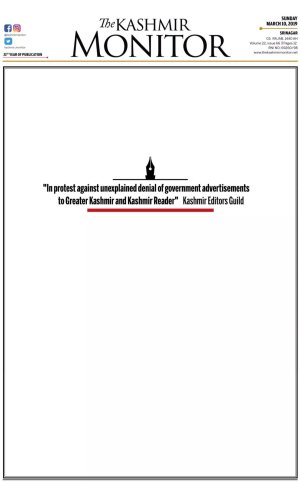MRSN
T20I Star
- Joined
- Oct 20, 2010
- Runs
- 30,601

Srinagar: Several prominent newspapers in Kashmir on Sunday published blank front pages to protest against the “unexplained denial of government advertisements to Greater Kashmir and Kashmir Reader”. The Kashmir Editors Guild had earlier sought the attention of the Press Council of India and the Editors Guild to exercise their legal, ethical and professional mandate to intervene in the issue and ensure that the media was not strangulated.
The government reportedly stopped advertisements to the two major dailies a day after the February 14 Pulwama attack in which over 40 CRPF jawans lost their lives.
Condemning the ban, the guild had said the media in Kashmir is one of the most professional and has retained its neutrality even at the cost of lives.
“It will continue to do so. The professional capacities of Kashmir media have been acknowledged world over. The Press Council of India has also issued a detailed report in 2018, detailing the issues and challenges that the Kashmir media is facing. It also addressed certain misconceptions about the media in the report. The guild also wants to reiterate that the attempts at strangulating the media is in continuation of what has happened in last more than three decades,” it said.
Former chief ministers Mehbooba Mufti and Omar Abdullah had also criticised the decision.
“For reasons best known to him, the Guvs (governor’s) admin (administration) in J&K has gone beyond its brief & is in no mood to step back. The decision to stop giving ads to local newspapers GK (Greater Kashmir) & Kashmir Reader is a punitive measure to force them into submission. Are they trying to stifle free press?” Mehbooba wrote on Twitter.
“In a classic case of shooting the messenger the state government is reported to have blocked Greater Kashmir newspaper group from any government advertisements. If true I’m not sure what this move is meant to achieve other than to create a pliant, subservient media,” Omar said.
Reporters Without Borders (RSF) in a statement condemned the move. “The government must restore state ads and treat all Kashmiri publications equally,” RSF said.
https://www.thedispatch.in/kashmir-newspapers-publish-blank-front-pages-today/






 )
)